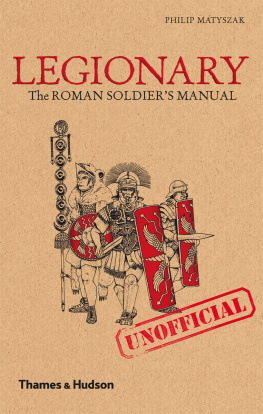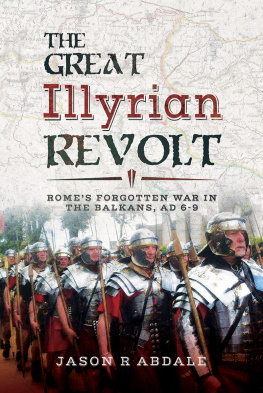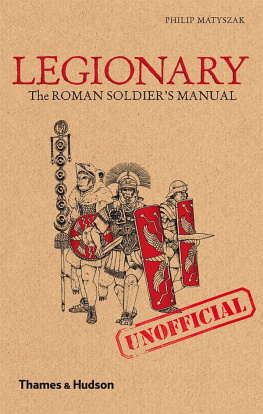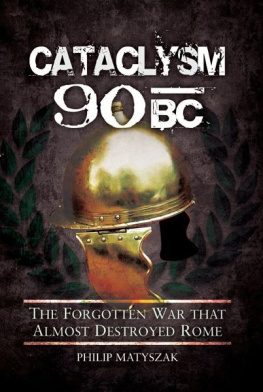Masters of the Sea
Ship of Rome
John Stack

To my beloved Adrienne
CHAPTER ONE
For an instant the low sun shone through the surrounding fog to illuminate the lone figure on the foredeck of the Aquila. Atticus had been motionless but the momentary shot of sunlight caused him to quickly lower his head and close his eyes tightly against the light. He raised his hand instinctively and rubbed his eyes with his thumb and forefinger, trying to wipe away the tiredness he could feel in every part of his body. Slowly raising his head, he spied the winter sun, estimating it to be no more than an hour above the horizon, its weakened rays only now beginning to burn off the sea mist which had rolled in so ponderously the evening before, and so the Roman galley continued to be enveloped in the all-consuming embrace of the fog.
The Aquila, the Eagle, was a trireme, a galley with three rows of oars manned by two hundred chain-bound slaves. She was of the new cataphract style, with an enclosed upper deck that protected the rowers beneath and improved the ships performance in heavy weather. As a galley she was a breed apart, the pinnacle of Roman naval technology and a fearsome weapon.
As the onshore wind freshened, blowing a cooling mist into his face, Atticus opened his mouth slightly to heighten his sense of smell. The oncoming wind and his position at the front of the trireme allowed him to filter out his surroundings, the salt-laden air, the smouldering charcoal braziers and the stench emanating from the slave decks below. The breeze would help conceal the Aquila, robbing any approaching ship of the opportunity of picking up the all-too-familiar smells of a Roman galley.
With his vision impaired by fog and, before that, darkness, Atticus had planned on detecting his prey by sound, specifically by the rhythmic beat of the drum marking the oar-strokes of the enemy biremes two rows of galley slaves. He knew from reports that the galley they were hunting would be travelling close to the shore, passing the inlet that hid the Aquila from the main channel. The fog afforded the Roman galley extended cover now that the sun had risen, but it was fickle and Atticus knew he could not rely on it as he had on the darkness of the pre-dawn.
Hobnails reverberating on the timber decking indicated a legionarys approach, and Atticus turned to watch the soldier emerge from the fog behind him. He was a hastatus, a junior soldier, recently recruited and untested in battle. He stood tall with broad shoulders, his upper arms disproportionately developed from long hours training with a gladius, the short sword of the Roman infantry. He wore full battledress and, although his face was expressionless beneath the iron helmet, Atticus sensed the mans confidence.
The legionary stopped four feet short of Atticus and stood to attention, raising his right fist and slamming it into his chest, a salute to the captain of the ship standing before him. The sound of the soldiers fist against chain mail sounded unnaturally loud in the quiet of the morning. The silence was shattered, a silence needed to ensure the Aquila remained undetected. As the legionary drew himself to his full height in anticipation of addressing a senior officer, Atticus reacted.
Beg to report, Captain, the legionary declared in a strident voice. As per regulation, he was looking straight ahead, but his eyes dropped quickly as the captain suddenly lunged at him, his expression murderous. The soldier tried to react but the movement was too quick and he felt the captains hand close over his mouth.
Keep your voice down, you whoreson, Atticus hissed. Are you looking to have us all killed?
The legionarys eyes widened in surprise and alarm as both his hands wrapped themselves around the captains wrist in an attempt to ease the pressure over his mouth. Panic flared as he realized that the grip was vicelike, the muscles in the captains arm like iron, the pressure unrelenting. Atticus relaxed his hold a little and the legionary gulped air into his lungs, dread still in his eyes which moments ago had showed only confidence. Atticus removed his hand, his face expressing the warning for silence that needed no vocal manifestation.
I, I the legionary spluttered.
Easy soldier, said Atticus, breathe easy.
As if for the first time, Atticus noticed how young the legionary was, barely eighteen at most. Septimus, the marine centurion, had twenty such hastati under his command. Fresh from the barracks, and before that a Roman family, these boys had eagerly signed on at sixteen to fulfil their duty as Roman citizens.
The centurion the soldier began haltingly, the centurion wishes to speak with you.
Tell him I cannot leave the foredeck.
The soldier nodded, as if the effort to speak was too much. He straightened up slowly.
Yes, Captain.
Once again he stood to attention, though not as sharply as before. He began to salute but stopped short of hitting his chest, his eyes locked on those of Atticus.
Im sorry, Captainabout before
No shame, soldier, now report to the centurion.
The legionary did an about-face and marched off, although this time with a softer step. Atticus watched him leave and smiled to himself. Ever since Septimus had come aboard the Aquila ten months ago, he had tried to impose his will on Atticus. As captain, Atticus was responsible for the ship and its crew of sailors, while Septimus was responsible for the reduced century of sixty marine infantry stationed on board. The ranks were, to all intents and purposes, equal, and it was the responsibility of both men to maintain the status quo between the commands. Atticus turned and took up his position at the bow of the trireme. He instinctively checked the line of his ship, satisfying himself that the four rowers, two fore and two aft, were keeping the trireme midstream. He became motionless again, rock steady, refocusing all his senses on the task at hand. As suddenly as it had blown up, the onshore breeze disappeared, robbing the Aquila of that additional advantage, shifting the odds again, this time in favour of the prey.
Septimus stood tall at the front of his assembled century in the aft section of the main deck. At six foot four inches and two hundred and twenty pounds he was a formidable sight. The centurion stood with his feet slightly apart, balancing himself against the gentle rolling of the deck, his right hand resting lightly on the hilt of his gladius, his left arm encircling his helmet. His dark Italian features were accentuated by a tangle of black curly hair, giving him a permanently dishevelled look.
The centurion had been standing ready since before dawn, over two hours in full battledress. The waiting never bothered Septimus. Over his twelve-year career as a Roman infantryman, he had developed the endless patience of the professional soldier. He began his career not long after the Battle of Beneventum, when the Roman legions finally routed the army of Pyrrhus of Epirus, the Greek aggressor who had sought to subdue Rome and expand his kingdom across the Adriatic. Where before the legions would have been disbanded after a campaign, the ferocity and swiftness of Pyrrhuss attack persuaded Rome that she needed to maintain a standing army, trained, disciplined, and ever ready. Septimus was one of this new breed, a career soldier, honed through discipline and battle, the backbone of the ever-expanding Republic.
The year before he had fought at the Battle of Agrigentum, the first pitched battle against the Carthaginians, the Punici, on the island of Sicily. As a member of the
Next page











